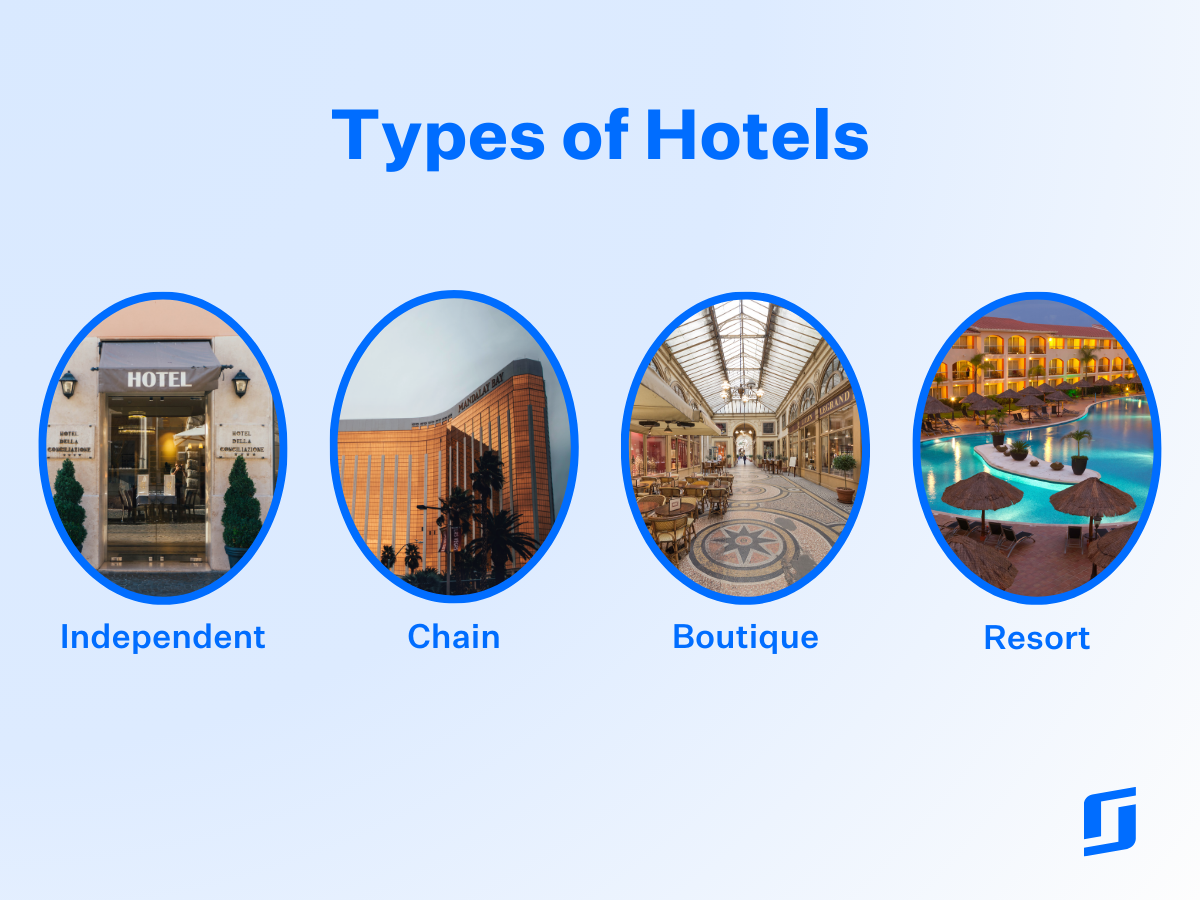What are types of hotels?
Types of hotels provide a short code definition, helping travellers to compare hotels and get an idea of what they can expect from the property. Hotels categorised by type can help break down confusion and guide potential guests towards the perfect hotel for their stay.
From large to tiny. Luxury to budget. And simple rooms to suites. We all know that hotels vary enormously, and it’s no surprise that we attempt to place similar hotels into groups, describing them by “type”.
Of course, there are so many different ways to classify and categorise hotels, and the list of hotel types is a long one.
So, what are the different types of hotels? And how do you correctly define and categorise your hotel for success? We’ve got you covered with this comprehensive guide.
Table of contents
Why is it important to know about hotel types?
It’s important to have a deep knowledge of hotel types because it will help your business achieve success and reach your revenue goals.
By understanding the types of hotels and key differences between hotel types, you can make pivotal decisions in selling more rooms and marketing your hotel effectively.
How will you market your hotel type to attract certain guest segments that may be more profitable than others?
What are the most popular types of hotels in tourism?
While there are many types of hotels in tourism, there are a few that travellers are most familiar with and that hoteliers are most likely to categorise themselves as.
Here are four different types of hotels that are common in tourism:
- Independent hotels – Small to large properties that are privately owned and come in all kinds of styles and themes.
- Chain hotels – Groups that have multiple properties in multiple locations, that all align to particular brand standards and experiences.
- Boutique hotels – Smaller, ultra stylish, properties that offer a deeply personalised service.
- Resort hotels – All-inclusive destinations that offer a variety of amenities, such as restaurants, pools, beaches, and activities.
SiteMinder also conducted research to see which type of accommodation travellers would choose for their next trip:
- Big chain/resort – 19%
- Hostel/motel/budget – 18%
- Vacation rental – 17%
- Boutique/luxury hotel – 16%
- Family/friends place – 14%
- B&B – 8%
Become the best type of hotel - one that succeeds What if you could boost your hotel's revenue and performance while also reducing your workload? Our smart hotel platform helps you do exactly that.
How many types of hotels are there?
The answer to this is quite subjective, since hotels can even be more than one type at a time. For instance, a hotel can be an independent hotel and a boutique hotel.
Some may say there are 15 types of hotels if you allow other property types such as motels into the conversation. Some may say there are more or less.
However, we’ve got a full list below that should give you a good idea of all the different types of hotels and hope you might think about your own property when trying to attract bookings.
What are the 15 types of hotels?
There really are limitless labels we can apply to hotels, however these are the different hotel types that are often used by hotels and in booking guides:
1. Independent hotel
Independent hotels are usually individually owned and might attract guests looking for something more unique or authentic.
2. Chain hotel
Chain hotels are group-owned and are often budget-friendly and attract guests that want the reliability of a well-established brand.
3. Budget and mid-range hotel
Hotels need to cater to all kinds of budgets and needs. Budget and mid-range hotels usually focus on providing comfort and convenience for a reasonable price. There might not be the fancy amenities of a bigger hotel, but there will be value for money.
4. Luxury hotel
Guests with money to burn and time to spend enjoying the hotel’s amenities might spend $1,000 a night on a luxury hotel. Luxury hotels go the extra mile and usually have impeccable guest services and amenities.
5. Resort hotel
Unlike a regular hotel, a resort hotel is designed for complete relaxation and enjoyment. These sprawling properties often encompass multiple restaurants, bars, swimming pools, and even recreational facilities like golf courses or spas. Many are situated in beautiful locations, near beaches or mountains, offering stunning views and easy access to outdoor activities.
6. Boutique hotel
A boutique hotel is a smaller hotel, usually under 50 rooms, which is big on personality. Whether it’s art-themed rooms, a small hotel in a heritage building, a culinary-focused experience or a luxury eco-retreat set in a tropical rainforest, the experience at a boutique hotel will be highly-tailored and certain to be memorable.
7. Motel
Motel is a shortened way to describe a motorist’s hotel – a place designed for people travelling along highways who need a place to stay. Traditionally, motels had rooms facing a parking lot to make it easy for guests to come and go. Today, they usually have fewer facilities and amenities on offer compared with a hotel.

8. Business hotel
No surprises here, a business hotel is equipped with amenities that will please those travelling for business, from fast wi-fi to modern office equipment. They’ll also be located in the CBD or business district and have plenty of single rooms on offer.
9. Family hotel
Kids club, on-site babysitting, larger rooms, kid-friendly pools, cots in rooms, family-friendly restaurants… a family hotel will have everything guests need when travelling and holidaying with a young family.
10. Extended stay hotel
An extended stay hotel offers a cost-effective way for guests looking to stay longer than the average guest. A self-serve laundry, in-suite kitchen and other conveniences you would normally find in a traditional apartment can often be found in these hotels.
11. Small, medium and large hotels
Hotels are often described by size. A small hotel generally has 150 rooms or fewer, a medium hotel has 151 to 299 rooms and a large hotel has 300 to 600 rooms.
12. One to seven star hotels
Star ratings are a well-known way to categorise hotels, and give a more precise idea of the quality of the hotel and range of amenities on offer. They also help guests compare the price of hotels with similar star ratings when making a decision on where to stay.
13. Limited and full-service hotels
The main difference here is that limited-service hotels will not have food and beverage available on-site. They may also have a more limited range of amenities, appealing to the cost-conscious traveller.
14. Amenity-focused hotels
Some hotels are set up to cater to a completely niche market like skiing, golf, water park, casino, spa, and conferences. Whether you dream of spending a few days playing golf, gambling or getting pampered, there’s a hotel that will make your dreams a reality.
15. Location-based hotels
Sometimes hotels are also described by their location such as the beach, downtown, or the airport. If guests want to experience a city like a local, a downtown hotel is their best option. If travellers are passing through on a quick stopover then an airport hotel will be most appropriate. Guests who simply want to chill by the beach? There’s a beach hotel waiting for them.
How to set your hotel type and achieve success
How you position your hotel in the market, identify your competition, define your ideal guests, build your brand, and then set up your marketing strategies and campaigns are all crucial factors in your success as a hotelier.
Understanding what hotel types your property falls into is information that will assist your decisions as you formulate your plans for success. So it’s important to ask yourself these questions:
- What hotel types could be used to describe my hotel?
- What other types of hotels are there in the area?
- What do these hotel types tell me about my ideal guests?
- How important and useful might these be in terms of branding?
- Which hotel type will help highlight my hotel’s unique selling point and ultimately sell more rooms to my ideal guests?

